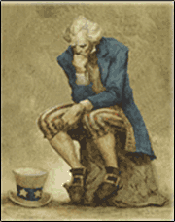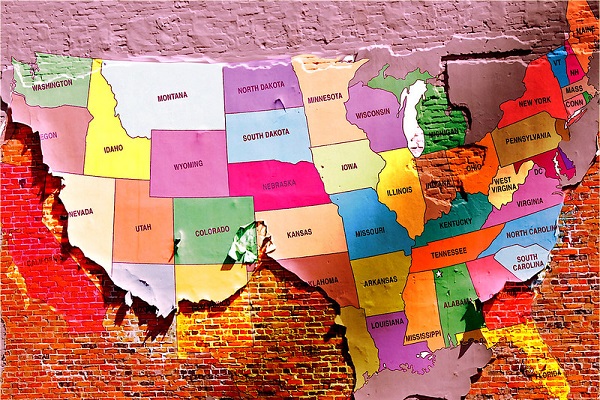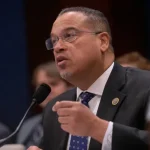
–>
March 11, 2023
The accepted definition of “racism” is “prejudice against members of a different ethnic group,” with “ethnic” defined as a “subgroup … with a common national or cultural tradition.” By this definition, residents of the South and the West constitute “ethnic groups,” and there is abundant evidence of prejudice against these regions in American history and in today’s politics and media.
‘); googletag.cmd.push(function () { googletag.display(‘div-gpt-ad-1609268089992-0’); }); }
What the Northern and coastal elite feel toward the South and West is a level of contempt that amounts to racism. For many decades, liberals have displayed a racist attitude toward white Southerners, a group with which most liberals in the coastal regions have little contact. When liberals ripped down the statues of Southern heroes such as Robert E. Lee and treated them with contempt, that was not just an act of removing the images of slaveholders — it was a display of racial disdain for the people of another region, the vast majority of whom are not descendants of slaveholders. One quarter of Southerners owned slaves, and some two percent owned large numbers of slaves on large plantations.
Regional racism of this kind has been a crucial element of American society since well before the Civil War — and it was, perhaps, the main reason why tensions between the North and South led to secession. One would imagine that in 2023, 162 years after the Civil War began, the regional wounds would have healed, but that is not the case. In a popular culture that appeals especially to Northern and coastal liberals, white Southerners are depicted as hillbillies, buffoons, racists, and religious extremists.
In the past, in a literary history stretching from Tobacco Road and The Grapes of Wrath to A Time to Kill and beyond, and in media from The Andy Griffith Show to Hee Haw, audiences despised, laughed at, and discriminated against Southerners. But even so, traditional liberals admitted that conservative Southerners had a right to participate in the political process. There was Hee Haw, but there was also Firing Line on public television, hosted by a conservative who defended states’ rights and regional differences. Now there is nothing akin to Firing Line on state-sponsored media, and progressives today would probably shut down Fox News if they could, just as they would eliminate the filibuster rule in the Senate so that debate emanating from the more conservative Southern states would be silenced.
‘); googletag.cmd.push(function () { googletag.display(‘div-gpt-ad-1609270365559-0’); }); }
It’s not just Southerners. The national psyche has always been ambivalent about the American West. In spite of admiration for its great national parks and celebration of the romantic cowboy culture, the West has always been viewed as irrelevant to the national debate. Its population is too small and, in the view of progressives, too culturally illiterate to count for much. President George W. Bush was derided as a “cowboy,” which meant an uncultured, poorly educated, and mentally challenged individual, despite his degrees from Yale and Harvard and his membership in Skull and Bones. In reality, Bush was far from uneducated or unintelligent, as were Vice President Dick Cheney (from Wyoming) and adviser Karl Rove (from Nevada and Utah). The view that everyone residing between the Mississippi and the Coastal Range, except those who ascribe to liberalism, is a dense cowboy with no right to be heard amounts to racism, and liberals need to admit it.
Long ago, the eminent sociologist John Shelton Reed investigated the nuances of regional racism and its implications for the national culture. Unlike ethnic racism, regional racism is largely invisible, at least to those outside the South and West. Within the national culture, regional stereotypes such as the redneck and the mountain pink, the role perfected by Dolly Parton in her highly successful music and acting career, seem “natural” rather than socially imposed. Today, from within the Second Reconstruction imposed by woke progressives, white Southerners are assumed to be racists and so are excluded from the national debate. It is telling that there are no white Southerners or non-Hispanic Westerners in the Biden Cabinet.
As Professor Reed understood, Neo-Reconstructionism is politically dangerous for America. Southerners; Westerners; and, increasingly, Midwesterners — the entire population of the American heartland — feel excluded and unrepresented by the leftist government in Washington. For progressives, white Southerners serve as a convenient bogeyman intended to drive black voters to the polls. As Biden once remarked during a 2012 campaign speech, “they’re gonna put y’all back in chains,” and President Obama’s office stated that it had “no problem with the remark.”
Who was the “they” in Biden’s infamous statement, and what was the point of referring to “chains”? The immediate object of his remark was the Romney presidential campaign, but beyond that, in Biden’s own words, was “every Republican.” By analogy, Biden was linking his opponents to slave-owners of the past and to the entire history of slavery, as if slavery, which had ended 150 years before, might be resurrected.
To this day, Biden continues to stoke racial division, as he did on his March 5 visit to Selma, Alabama, where he repeated an unproven claim that he had been a “civil rights activist.” On the 58th anniversary of “Bloody Sunday,” Biden claimed that for blacks in the South, the right to vote “remains under assault.” Biden also used the opportunity to attack Florida’s Gov. Ron DeSantis, who has moved to block radical anti-white teaching in his state’s public schools. For nearly a century, Democrats have stoked racial, and regional, division to drive the black and liberal vote; there’s no doubt Biden will use the false narrative of racism in the South to increase black support if he runs in 2024. This time, it will be DeSantis putting y’all back in chains.
As Americans migrate in larger numbers to the South and West (the population of Oklahoma City is now close to three times that of Boston, and Miami is perhaps the most dynamic and technologically savvy city in the nation), the political and economic power of the South and West will grow. So, too, will their cultural importance. But politicians like Biden will continue to stoke division for their own political purposes, no matter how damaging this divisiveness is to the nation as a whole.
‘); googletag.cmd.push(function () { googletag.display(‘div-gpt-ad-1609268078422-0’); }); } if (publir_show_ads) { document.write(“
Biden, Schumer, and Pelosi — the three aging horsemen of the progressive apocalypse — are the last stand of the American left. They represent the outdated hegemony of the liberal North, and with it the racial vestiges of a long-forgotten war. Regional racism persists, but the mounting power and wealth of the South and West eventually will make it seem irrelevant. Long ago, citizens of the South and West decided to put the past behind them and assimilate to the national culture, even after a civil war that killed 850,000 Americans and devastated the South. Biden isn’t doing the nation any good by attempting to exclude them. America can succeed only if Americans are united and work together.
Jeffrey Folks is the author of many books and articles on American culture, most recently Heartland of the Imagination (2011).

Image: Don Hankins via Flickr, CC BY 2.0.
<!– if(page_width_onload <= 479) { document.write("
“); googletag.cmd.push(function() { googletag.display(‘div-gpt-ad-1345489840937-4’); }); } –> If you experience technical problems, please write to [email protected]
FOLLOW US ON
<!–
–>
<!– _qoptions={ qacct:”p-9bKF-NgTuSFM6″ }; ![]() –> <!—-> <!– var addthis_share = { email_template: “new_template” } –>
–> <!—-> <!– var addthis_share = { email_template: “new_template” } –>







